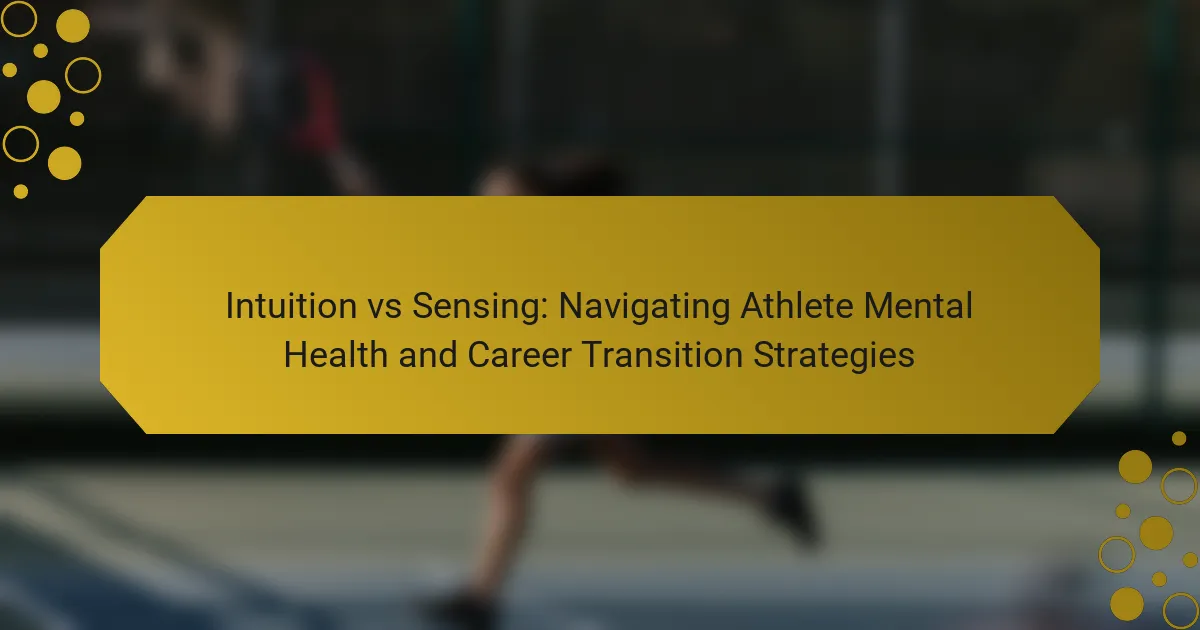Understanding the balance between intuition and sensing is essential for athletes facing mental health challenges during career transitions. This article explores how these cognitive styles influence decision-making and emotional responses, effective post-career planning strategies, and the importance of mental resilience and social support. It also highlights the role of emotional intelligence and self-awareness in navigating this critical life change. Prioritising these factors can significantly enhance athletes’ well-being and success after retirement.

How do Intuition and Sensing Influence Athlete Mental Health?
Intuition and sensing significantly impact athlete mental health by shaping decision-making and emotional responses. Intuition allows athletes to trust their instincts, fostering confidence during competition. In contrast, sensing emphasises awareness of physical sensations and immediate environments, which can enhance focus but may also lead to anxiety if athletes fixate on performance metrics. Balancing these cognitive styles is crucial during career transitions, as athletes navigate identity changes and mental health challenges. Understanding how these elements interact can inform tailored support strategies for optimal mental well-being.
What are the key differences between Intuition and Sensing?
Intuition and Sensing differ in how individuals perceive and interpret information. Intuitive individuals focus on patterns and possibilities, while Sensing individuals prioritise concrete facts and details.
Intuition emphasises future-oriented thinking and abstract concepts, aiding athletes in envisioning potential outcomes during career transitions. Sensing supports practical decision-making, helping athletes to assess their current situation accurately.
This distinction is crucial for mental health strategies, as tailored approaches can enhance an athlete’s coping mechanisms. Understanding these differences allows for more effective communication and support in navigating career transitions.
How do these cognitive styles affect emotional well-being?
Cognitive styles significantly influence emotional well-being during athlete career transitions. Intuitive athletes may experience heightened adaptability, fostering resilience. In contrast, sensing athletes often rely on structured routines, which can lead to stress when faced with uncertainty. Understanding these styles helps tailor mental health strategies effectively.
What role does self-awareness play in understanding these styles?
Self-awareness is crucial for athletes in understanding their intuition and sensing styles. It enhances their ability to recognise personal strengths and weaknesses, guiding effective mental health strategies. This understanding fosters better decision-making during career transitions, allowing athletes to align their choices with their core values and instincts. By cultivating self-awareness, athletes can navigate the complexities of their mental health and career paths more effectively.
What are common mental health challenges faced by athletes transitioning careers?
Athletes transitioning careers often face mental health challenges such as anxiety, depression, and identity crises. These issues stem from the pressure of performance, loss of structured routine, and the struggle to redefine self-worth beyond sports. Transitioning athletes may experience a significant drop in social support and face uncertainty about their future, leading to feelings of isolation. Developing coping strategies and seeking professional support are crucial for managing these challenges effectively.

What are the universal attributes of effective post-career planning?
Effective post-career planning for athletes includes self-assessment, goal setting, support systems, and mental health strategies. These attributes ensure a smooth transition and long-term well-being. Self-assessment helps identify strengths and interests, while goal setting provides direction. Support systems, including mentors and peers, offer guidance and encouragement. Lastly, focusing on mental health is crucial for coping with the emotional challenges of retirement.
How can athletes leverage their intuition in career transitions?
Athletes can leverage their intuition during career transitions by trusting their instincts and experiences. This approach allows them to navigate uncertainties and make informed decisions. Intuition can guide athletes in identifying new opportunities that align with their values and passions. Engaging in reflective practices enhances intuitive insights, helping athletes assess their strengths and interests. Additionally, seeking mentorship can provide valuable perspectives, further enhancing intuitive decision-making.
What practical strategies can enhance sensing capabilities?
Practising mindfulness and engaging in reflective journaling are effective strategies to enhance sensing capabilities. These methods foster awareness and improve emotional regulation, which are crucial for athletes navigating mental health challenges and career transitions. Regular physical activity and maintaining a balanced diet further support cognitive function and sensory awareness.

What unique attributes contribute to a successful transition for retired athletes?
Successful transitions for retired athletes hinge on unique attributes like mental resilience, adaptability, and social support. Mental resilience enables athletes to cope with identity shifts and emotional challenges. Adaptability allows them to embrace new career paths and lifestyles. Social support networks provide essential encouragement and guidance during this significant life change. These attributes collectively enhance mental health and facilitate smoother transitions.
How can personal values shape career choices after sports?
Personal values significantly influence career choices after sports by guiding decisions aligned with individual beliefs. Athletes often prioritise values such as teamwork, discipline, and resilience, which can shape their post-sport careers. For instance, those valuing community may pursue coaching or mentorship roles. As a result, understanding personal values can lead to fulfilling career transitions that reflect one’s identity and purpose.
What role does mentorship play in post-career mental health?
Mentorship significantly enhances post-career mental health for athletes. It provides guidance, emotional support, and a sense of belonging during transitions. Research indicates that mentorship reduces feelings of isolation and anxiety, fostering resilience. Effective mentorship programs can lead to improved well-being and a smoother career transition.
How can athletes find the right mentors?
Athletes can find the right mentors by seeking individuals with relevant experience and shared values. Start by identifying successful professionals in your sport. Attend networking events and engage in online communities to connect with potential mentors. Look for those who demonstrate a genuine interest in your development and can provide personalised guidance. Prioritise mentors who have navigated similar career transitions, as they can offer valuable insights.
What are the psychological benefits of engaging in new hobbies?
Engaging in new hobbies enhances mental health by reducing stress, boosting self-esteem, and fostering social connections. These psychological benefits support athletes during career transitions. For instance, pursuing creative activities can improve emotional resilience, helping athletes navigate challenges effectively. Additionally, new hobbies provide a sense of accomplishment, which is vital for maintaining motivation and focus.

What rare attributes can enhance an athlete’s post-career success?
Emotional intelligence is a rare attribute that can significantly enhance an athlete’s post-career success. It enables better decision-making, relationship building, and adaptability in new environments. Additionally, resilience, often cultivated through sports, supports successful transitions by fostering perseverance in the face of challenges. Networking skills, though less emphasised, can create valuable connections in various fields, opening doors to new opportunities. Finally, a strong sense of purpose drives athletes to pursue meaningful endeavours after retirement, contributing to long-term fulfilment and success.
How can creative expression support mental health in retirement?
Creative expression significantly enhances mental health in retirement by fostering emotional well-being and social connections. Engaging in arts, writing, or music can reduce feelings of isolation and depression. Research indicates that retirees who participate in creative activities report higher levels of happiness and life satisfaction. Additionally, creative expression serves as a unique outlet for processing life transitions, allowing individuals to navigate their new identity post-retirement.
What innovative approaches are being used in athlete support programmes?
Innovative approaches in athlete support programs focus on mental health and career transitions. These programs utilise holistic methods, integrating psychological support with practical career guidance.
One effective strategy is the implementation of personalised mental wellness plans. These plans are tailored to individual athlete needs, addressing unique stressors and promoting resilience.
Additionally, mentorship initiatives connect athletes with former professionals who provide insights and support during transitions. This peer guidance fosters a sense of community and shared experience, enhancing emotional well-being.
Technology also plays a crucial role. Apps and platforms offer mental health resources, enabling athletes to access support anytime. These tools facilitate self-assessment and provide coping strategies, making mental health care more accessible.

What practical steps can athletes take for better mental health during transitions?
Athletes can enhance their mental health during transitions by prioritising self-awareness and seeking support. Establishing routines can provide stability, while mindfulness practices help manage stress. Engaging in open communication with coaches and peers fosters a supportive environment. Setting realistic goals aids in maintaining focus and motivation.
How can mindfulness practices be integrated into daily routines?
Mindfulness practices can be seamlessly integrated into daily routines by incorporating short, intentional moments of awareness. Start with brief meditation sessions, focusing on breath for five minutes each morning. Utilise mindfulness techniques during everyday activities, such as eating or walking, by paying attention to sensations and thoughts. Schedule regular check-ins throughout the day to assess mental state and emotions. As a result, these practices enhance mental clarity, reduce stress, and improve overall well-being.
What are the best practices for maintaining a support network?
To maintain a support network effectively, prioritise open communication and mutual trust among members. Regular check-ins strengthen connections and provide emotional support. Establish clear roles within the network to ensure everyone knows how to contribute. Encourage sharing of experiences related to mental health and career transitions, fostering a safe space for discussion. Consider organising group activities to enhance bonding and collaboration.
What common mistakes should athletes avoid in their post-career planning?
Athletes should avoid several common mistakes in post-career planning. Failing to seek professional guidance can lead to poor financial decisions. Neglecting mental health during transition can exacerbate stress and anxiety. Underestimating the importance of networking may limit future opportunities. Ignoring personal interests and passions can result in dissatisfaction. Lastly, not setting clear goals can hinder successful career shifts.
How can athletes create a personal development plan for life after sports?
Athletes can create a personal development plan by assessing their skills and interests beyond sports. Start by identifying transferable skills such as teamwork and discipline. Next, set clear, achievable goals related to education or career paths. Incorporate mental health strategies like mindfulness to manage stress during the transition. Regularly review and adjust the plan to stay aligned with evolving aspirations.
What expert insights can guide athletes through mental health challenges?
Expert insights emphasise the importance of mental resilience and self-awareness for athletes facing mental health challenges. Techniques such as mindfulness, cognitive behavioural strategies, and open communication with coaches and peers can facilitate smoother career transitions. Research indicates that athletes who engage in mental health training report improved performance and well-being. Additionally, developing a support network enhances coping mechanisms during challenging times.
